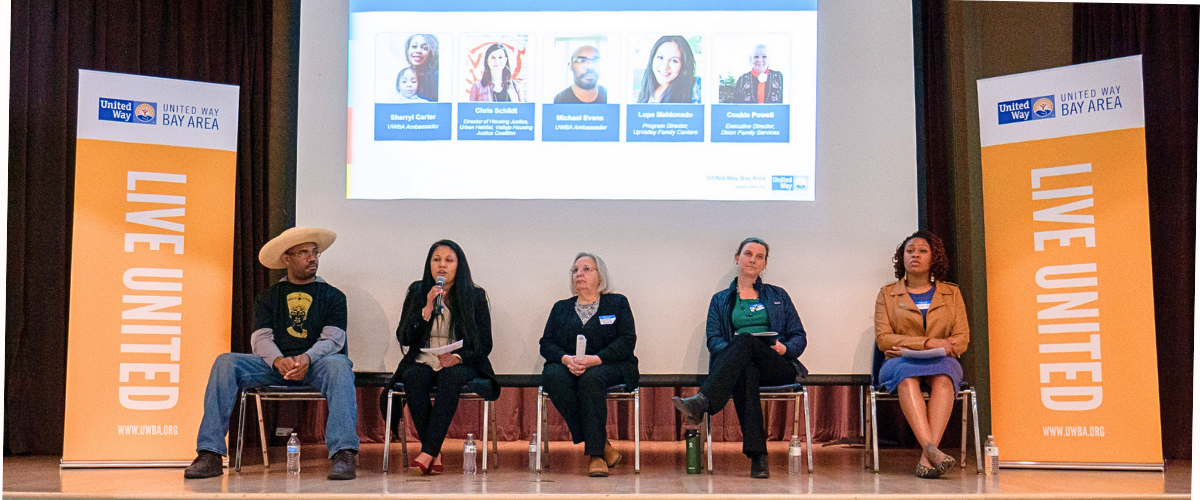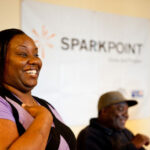Search
UWBA’s United for Equity Partner Convening
March 23, 2023
Our Name and What We Stand For

At United Way Bay Area (UWBA), when we say we’re committed to creating an equitable future for all our communities, we mean we bring together partners, advocates and residents to address our neighbors’ most pressing issues. It also means we partner with research groups to help us understand problems and find solutions with a data-driven lens. That’s why we recently held an in-person partner convening event, where we were joined by partner organizations UpValley Family Center (UVFC), Dixon Family Services (DFS), and Urban Habitat (UH), along with UWBA Ambassadors* to discuss some of the findings in our most recent study Understanding Economic Stability and Funding, conducted by Applied Survey Research (ASR).
Preliminary Findings
“San Francisco [County] accounted for 38% of the foundation giving in the Bay Area [between 2018-2020], but they only account for 12% of the Bay Area population. Solano County accounts for 6% of the Bay Area population, and receives less than one percent, at 0.3% of the funding. Napa [County]represents 2% of the population and gets 0.4%.” – Elizabeth Mower, Applied Survey Research
After nearly two decades, and multiple studies* that repeatedly found Solano County to be substantially under-resourced when compared to the other eight Bay Area counties, UWBA partnered with ASR in 2022 to conduct a special study for the purpose of helping all funders improve overall funding patterns to more equitably meet the needs of our communities. ASR Project Manager, Elizabeth Mower (Martinez), was on-site to present some of the preliminary findings of this study.
“The demographic information doesn’t reflect populations who are living in poverty,” Mower said. “It’s just the demographic makeup of those areas. So, understanding that race and socio-economic status have been intimately tied historically, this information is really great context for us to understand [if we are] funding things that are culturally relevant and supportive to communities that are being served in those areas.”
A full report on the Bay Area study will be released publicly in the coming months, with an analysis of their findings.
Partner Panel
The event also included a panel discussion featuring UWBA Ambassadors Sharryl Carter and Michael Evans, along with UVFC Program Director, Lupe Maldonado, DFS Executive Director, Cookie Powell, and UH Housing Justice Director, Chris Schildt.
Panelists reacted to the findings presented in the study, but also used the time to field questions, focusing on the pressing need for increased support for resources to assist those who continue to struggle in the wake of the pandemic with basic needs, housing and overall access to aid outside of emergency situations like wildfires or floods.
“The difference between Solano and Napa County versus San Francisco was alarming to me. It was interesting to see that although certain regions have high populations, there still isn’t proportion[al] funding given, so it’s concerning.” – Sharryl Carter, UWBA Ambassador
“Wildfires definitely opened the door to us for funding sources. But that was a one-time funding source, it’s not ongoing. So, we have responded to wildfires… [But what] we experience [is that] private foundations in the Bay Area are not allowing us to apply for their funding. So that’s a huge gap for us. In Calistoga, 80% of the students at the public school are free and reduced lunch – that tells us a lot about the need in our community.” – Lupe Maldonado, UpValley Family Center
The lack of affordable housing was highlighted as the single greatest issue in Solano County. The Bay Area having one of the highest costs of living in the country has led to a housing crisis that disproportionately affects individuals and families with low incomes. That, coupled with the under-resourcing of certain counties, has exasperated an already intolerable situation for the populations of these areas. The panelists emphasized the need for ongoing investment into existing programs that can provide assistance for those experiencing, or on the verge of experiencing homelessness.
“Our problems stem from poverty, high unemployment, and lack of housing. Back when I first started in 1995, we would have a family come to us that was [suddenly] homeless, they got evicted, and they couldn’t maintain the rent they were paying. We would just tell them to find something else that they could [better] afford. That’s no more. That doesn’t exist anywhere.” – Cookie Powell, Dixon Family Services
Food assistance was also identified as a basic need that many individuals and families in the Bay Area struggle to access. The panelists discussed the importance of supporting local food banks and organizations that provide food assistance, which can have a positive impact on the health and well-being of local communities, as well as help to provide some breathing room for families having to decide between buying food or paying rent.
When asked about existing resources that are making a positive and noticeable impact, one of the most valued resources to be noted during the panel was SparkPoint, a UWBA program that provides economic assistance, financial coaching and career services aimed at helping families and individuals achieve financial stability.
“I’ve been a member of SparkPoint since before I came to this county. They helped me pay my rent once. My rent is $3300 a month to live in a townhouse. The people there… told us that they’re not going to push back our rent date, but SparkPoint has been very helpful!” – Michael Evans, UWBA Ambassador
Additionally, the panel noted, somewhat ironically, that Covid-19 actually proved to be a “bright spot” in terms of funding. The pandemic opened the door to new avenues of funding for safety net services and prompted more entities to allow nonprofit organizations to apply for rental and utility assistance. Though whether these funding resource avenues would continue now that California has moved largely into post-pandemic operations – discontinuing pandemic protections, eviction moratoriums, etc. – is something that remains to be seen.
“We’ve seen that there’s been a funding increase in emergency assistance due to covid. I think that we would all agree that it’s still not enough. We know it won’t last long enough. In terms of the bright spots, I think we can point to what we’ve been able to do with the funding. We have thirteen leaders in the city of Vallejo, who are being trained in leadership skills, in speaking publicly, in knowing their rights as tenants, building up tenants’ associations, and building up collective power to be able to advocate for what they need.” – Chris Schildt, Urban Habitat
UWBA remains committed to improving the lives of those in need in our Bay Area community; bringing community partners together to share experiences and expertise is one of the ways we work towards that goal. We invite you to join us in this mission. There are various ways you can help support our efforts, including volunteering your time or making a donation. Together, we can create a more equitable Bay Area for everyone.
*UWBA Ambassadors have lived experiences with UWBA programs and/or services and now utilize their experiences for advocacy and to keep community voices at the center of our initiatives.
*Additional studies referenced: “Foundation Giving in Solano County and the Bay Area” – First 5 Solano (2016, 2018 Update), “Regional Resegregation: Building Power in Bay Area Suburbs” – Urban Habitat


